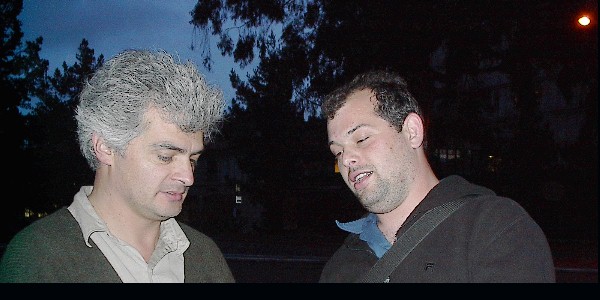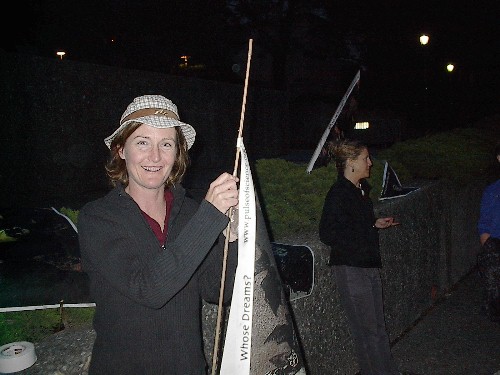From the Open-Publishing Calendar
From the Open-Publishing Newswire
Indybay Feature
UC Bioengineering/Chapela awareness week
All week from Monday May 16-May 20th, a low-key demo is being carried out at UC Berkeley with the purpose of creating awareness about the new 12-storey bioengineering building under construction at the mining circle, awareness about the changing source of funding for the university away from taxpayer funds towards higher student tuition and private research funds with an incentive for patent generating choices of research, and awareness about Professor Ignacio Chapela's lawsuit against the university after his tenure was denied despite the near unanimous support of the review committee, when Monsanto opposed his research into behavior of transgenic maize in southern Mexico.

This demo is being held at 7-8am and 8-9pm each day. This is finals week, and these hours were chosen to accomodate people's working schedules, and having a large or noisy protest when lots of campus people are around is not the objective here. Rather, the idea for people to regularly circle the building on bicycles with banners depicting images of owls and de Goya's paintings of a nightmare scene, and to create awareness of our concern through thoughtful persistence all week.
There will be speakers on Wednesday - Friday evening, including Gray Brechin, author of Imperial San Francisco.
So because this was not designed with a huge flyering effort, it would be nice if supporters could come at these times and join the parade of bikes sending a signal on campus parkway at the mining circle.
This idea for the demonstration style might sound unusual on paper, but if you have attended Chapela's lectures, you would understand that he is very widely read and brings in several references and examples from literature and art into most of his talks. He asks students to read the international press and starts class with discussion of current events during the first 5 minutes, and he often has a stack of books from various fields that he has brought in. He is also good at eliciting meaningful class participation, which many starting lecturers find difficult because many of the best academics at a research university have only experienced a couple of semesters as a teaching assistant grading papers, hosting labs, and holding office hours. Chapela is talented at a lot of things, and almost all of his peers here at Berkeley are impressed by his work and teaching.
Ignacio Chapela (read about his case here http://www.eastbayexpress.com/issues/2002-05-29/news/feature.html http://www.eastbayexpress.com/issues/2004-10-13/cityside.html ) has the support of pretty much everyone I have spoken to in the environmental science and IBiology departments at Berkeley, and he is also not the only biology professor who has had his research 'replicated' in a suspicious manner by agriculture and chemical corporations who found their results disfavorable (read about Tyrone Hayes).
People carrying out this awareness demo are not claiming that all research that might be carried out inside will be wrong, in the sense that nuclear weapons research could be fundamentall wrong. Instead, they want more discussion and awareness about society's allocation of research money, and indeed, Chapela has argued for free market choice of the products resulting from nontraditional agricultural bioengineering methods. For instance, crops with genes for pesticide resistance should be labeled as such, and consumers should be able to freely select it in stores with full information. Additionally, much of the money going into biotech research (speaking as a genetic researcher, with two family members who have worked for private companies and university research hospitals), actually comes from the already high U.S. societal allocation for healthcare in the form of high insurance and drug costs. If billions of dollars (such as the $6 billion we voted to tax ourselves for stem cell research, which is higher than the entire UC Budget, and is 50% higher than the yearly state budget of Nebraska, incidentally) are put into development of new drugs and cures, when many pharmacologists say that quite a few new drugs replicate older effective drugs, this is not nearly as cost efficient as public health efforts such as having healthy food and exercise opportunities, and simple prevention of disease spread
There will be speakers on Wednesday - Friday evening, including Gray Brechin, author of Imperial San Francisco.
So because this was not designed with a huge flyering effort, it would be nice if supporters could come at these times and join the parade of bikes sending a signal on campus parkway at the mining circle.
This idea for the demonstration style might sound unusual on paper, but if you have attended Chapela's lectures, you would understand that he is very widely read and brings in several references and examples from literature and art into most of his talks. He asks students to read the international press and starts class with discussion of current events during the first 5 minutes, and he often has a stack of books from various fields that he has brought in. He is also good at eliciting meaningful class participation, which many starting lecturers find difficult because many of the best academics at a research university have only experienced a couple of semesters as a teaching assistant grading papers, hosting labs, and holding office hours. Chapela is talented at a lot of things, and almost all of his peers here at Berkeley are impressed by his work and teaching.
Ignacio Chapela (read about his case here http://www.eastbayexpress.com/issues/2002-05-29/news/feature.html http://www.eastbayexpress.com/issues/2004-10-13/cityside.html ) has the support of pretty much everyone I have spoken to in the environmental science and IBiology departments at Berkeley, and he is also not the only biology professor who has had his research 'replicated' in a suspicious manner by agriculture and chemical corporations who found their results disfavorable (read about Tyrone Hayes).
People carrying out this awareness demo are not claiming that all research that might be carried out inside will be wrong, in the sense that nuclear weapons research could be fundamentall wrong. Instead, they want more discussion and awareness about society's allocation of research money, and indeed, Chapela has argued for free market choice of the products resulting from nontraditional agricultural bioengineering methods. For instance, crops with genes for pesticide resistance should be labeled as such, and consumers should be able to freely select it in stores with full information. Additionally, much of the money going into biotech research (speaking as a genetic researcher, with two family members who have worked for private companies and university research hospitals), actually comes from the already high U.S. societal allocation for healthcare in the form of high insurance and drug costs. If billions of dollars (such as the $6 billion we voted to tax ourselves for stem cell research, which is higher than the entire UC Budget, and is 50% higher than the yearly state budget of Nebraska, incidentally) are put into development of new drugs and cures, when many pharmacologists say that quite a few new drugs replicate older effective drugs, this is not nearly as cost efficient as public health efforts such as having healthy food and exercise opportunities, and simple prevention of disease spread
For more information:
http://www.pulseofscience.org
Add Your Comments
We are 100% volunteer and depend on your participation to sustain our efforts!
Get Involved
If you'd like to help with maintaining or developing the website, contact us.
Publish
Publish your stories and upcoming events on Indybay.
Topics
More
Search Indybay's Archives
Advanced Search
►
▼
IMC Network







